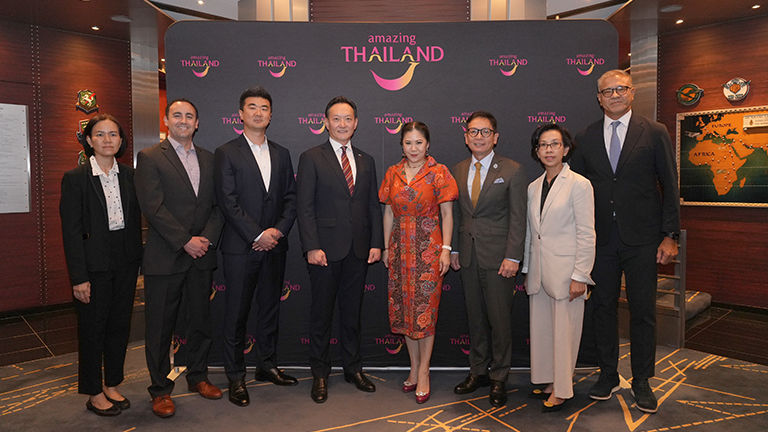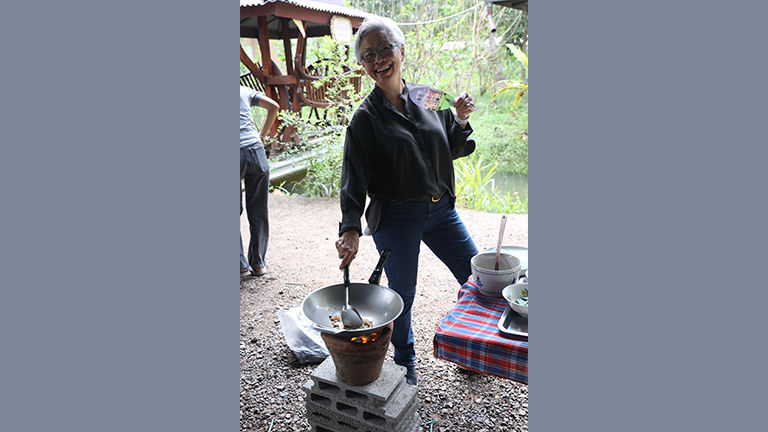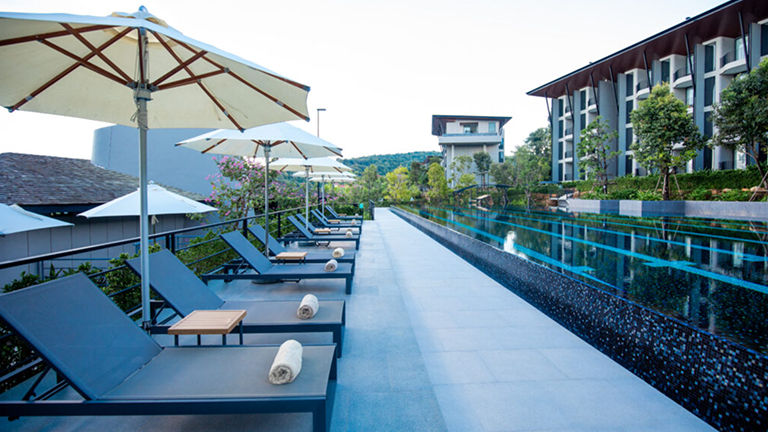The farmer drew his knife from a leather sheath at his hip and sliced through tightly bound coconut tree flowers. He held up spoons, gingerly collecting the sap, and handed them out for us to taste. No part of the coconut tree goes to waste at Baanrimklong, a farm, homestay and hub for community-based tourism in Samut Songkhran, Thailand. Even the sap can be processed into granulated coconut sugar, a key ingredient in the traditional pad Thai that Baanrimklong’s guests learn to prepare for themselves on an outdoor clay stove.
Baanrimklong is one of a dozen partners that was highlighted during Tourism Cares’ first-ever Meaningful Familiarization Tour, held last month and created in partnership with the Tourism Authority of Thailand (TAT), Delta Air Lines and Korean Air. Through networking opportunities; panel discussions; and immersive visits to sustainable communities, hotels, restaurants and farms, the fam aimed to inspire attendees to make a difference in their businesses by integrating meaningful travel.
 Tourism Cares’ first Meaningful Familiarization Tour was held in partnership with the Tourism Authority of Thailand, Delta Air Lines and Korean Air.
Tourism Cares’ first Meaningful Familiarization Tour was held in partnership with the Tourism Authority of Thailand, Delta Air Lines and Korean Air.
Credit: 2024 Tourism Authority of Thailand
“Meaningful travel ensures direct benefits for host communities, protects cultural and environmental assets and connects guests with a destination in a deeper way,” said John Sutherland, director of community impact at Tourism Cares. “We were incredibly lucky to partner with the Tourism Authority of Thailand on this program, because the team understood the vision right away and ran with it.”
Meaningful travel ensures direct benefits for host communities, protects cultural and environmental assets and connects guests with a destination in a deeper way.
Unique and Memorable Experiences
The trip showcased local Thai organizations creating social and environmental impact through immersive tours and experiences, such as Patom Organic Living, a sustainable attraction in Nakhon Pathom. A certified organic property since 2012, Patom comprises a 10-acre farm, a cafe, a factory and a market with hands-on experiences for guests.
Here, we crafted our own essential oil rollers and potpourri satchels with dried flowers from the garden and enjoyed a high tea of steamed banana mousse, sweet sticky rice with shrimp and blue butterfly tea. During a walking tour and presentation, we learned that Patom connects some 200 farmers with business partners, including local hotels searching for fresh ingredients. Patom also donates 3% of annual sales to the Sookjai Foundation to support farmers transitioning from conventional to organic practices.
“When we use travel as a force for good, we have a lot of power to make a positive impact,” Sutherland said. “Our goal with our first Meaningful Travel Fam is to facilitate authentic connections between the travel trade and our 12 Impact Partners in Thailand, who are trying to make a difference in their local communities through travel.”
When we use travel as a force for good, we have a lot of power to make a positive impact.
Not only do local communities, suppliers and buyers benefit from the Meaningful Fam Tour, so do future travelers who will ultimately have a deeper relationship with the destination when they return home.
During our trip, for example, we spent time with the Muslim villagers of Baan Nai Nang in Krabi. We assisted with a mangrove restoration project by releasing bees in a mangrove forest, got our hands sticky making steamed banana cakes (kanom kluay) and picked fistfuls of morning glory from the garden, pan-frying the leafy greens with garlic, chili, fish sauce and oyster sauce on outdoor woks. Even though fam attendees were well-traveled advisors and buyers, these were not cookie-cutter experiences we’d had before, nor were we likely to experience them again.
 Fam participants enjoyed unique activities including cooking on outdoor woks.
Fam participants enjoyed unique activities including cooking on outdoor woks.
Credit: 2024 Tourism Authority of Thailand“I am Thai, but I've been in the States for more than 50 years, and I have not traveled through Thailand that much,” said Dee Buizer, owner of Arizona-based Luxe Travel, a Frosch company. “This fam tour has opened my eyes and heart. All of my original thoughts for the Thailand itineraries I’m building for this year and next went aside during this fam trip, and I plan on changing my itineraries to include Impact Partners like Baanrimklong for their fabulous effort in producing coconut sugar, and Varana Hotel in Krabi for their incorporation of sustainable products at a high level of luxury.”
Sustainability Without Sacrifice
Indeed, two nights spent at the five-star Varana Hotel were a highlight for attendees, several of whom took advantage of its Japanese Onsen and Thai massage therapy at Faa Spa. When lounging at the pool bar with views of Dragon Crest Mountain or listening to a live DJ while sprawled out on a daybed at the Beach Club, we weren’t thinking much about the hotel’s responsible practices — and that’s intentional. Something attendees learned firsthand on the fam is that “sustainability” doesn’t have to mean “sacrifice."
We were surprised to learn that just about every facet of Varana Hotel aligns with the Thai government’s Bio Circular Green Economy model. This post-pandemic recovery strategy strives for economic progress through social development and sustainability. To that end, Varana has taken a 360-degree approach toward decarbonization, which means chemical-free housekeeping, a zero-waste kitchen, solar-powered lighting and even a fleet of electric tuk-tuks to transport guests around the property and to nearby attractions. I loved seeing upcycled materials reflected in the design, such as headboards made with rice bags and building accents crafted from oil drums.
 Varana Hotel focuses on sustainable and responsible practices, without sacrificing any aspect of the guest experience.
Varana Hotel focuses on sustainable and responsible practices, without sacrificing any aspect of the guest experience.
Credit: 2024 Varana HotelPerhaps most innovative of all is the property’s groundwater banking system, made from renewable bamboo and recycled materials, mimicking natural aquifers. The system operates without electricity, saves water and reduces ground temperatures, serving as a “zero-emission outdoor air conditioner” that keeps guests cool and nourishes the gardens and landscaped grounds.
Other highlights of the Meaningful Travel Fam included a day of sightseeing in Bangkok using only green modes of transportation, such as electric tuk-tuks and solar-powered longtail boats that formerly ran on diesel. It was also a treat to dine at Sivatel Bangkok Hotel’s Cafe Jardin which, on the last day of the fam trip, was awarded a $5,000 grant from Tourism Cares for its unique “From Kitchen to Chicken” initiative.
The grant will fund Cafe Jardin’s zero-waste program, which starts with feeding the restaurant’s leftover food scraps to black soldier flies in an effort to produce black soldier fly larvae. In a circular economy, the larvae will then be fed to the chickens that Cafe Jardin purchases from its partner farms, ultimately ending right back on the plates they serve. Cafe Jardin also hopes to get other restaurants involved in the program, so that more businesses can leverage the system and become zero waste themselves.
Beyond the Meaningful Travel Fam, TAT remains bullish on further developing and promoting responsible tourism practices throughout the Land of Smiles. The next two years will emphasize the importance of cultural preservation and environmental protection through strategic marketing efforts and industry events.
“In August of this year, we will host Thailand’s first-ever Amazing Thailand Responsible Tourism Fair,” said Siripakorn Cheawsamoot, TAT’s deputy governor for international marketing in Europe, the Americas, the Middle East and Africa. “It will serve as a platform for Thai tourism businesses to connect with buyers from all over the world, showcasing meaningful travel throughout each part of the customer journey, from green transportation to immersive experiences with local communities.”
Ending on a high note, Cheawsamoot closed the Meaningful Travel Fam with a big announcement for the year ahead.
“We are so excited to further our partnership with Tourism Cares next year and host the Tourism Cares Meaningful Summit in 2025,” he said. “TAT hopes to organize more meaningful fam opportunities with our partners and drive the industry toward sustainability.”
Getting There
Delta Air Lines and Korean Air provide service from nine U.S. hubs to Bangkok through a codeshare and connection through Seoul’s Incheon International Airport. This year marks the 6th anniversary of the Delta and Korean Air joint venture, a trans-Pacific network connecting 290 destinations in the Americas and 80 destinations in Asia.
In terms of sustainability, Delta aims to reach net-zero emissions by 2050. Since 2022, the carrier has reduced onboard single-use plastic consumption by approximately 5 million pounds annually. Korean Air was one of the first airlines to adopt the use of Sustainable Aviation Fuel (SAF). SAF is made from grains, algae and other organic compounds and can reduce a flight’s carbon emissions by 80%. The carrier also upcycles materials from old uniforms, blankets and even retired planes, turning them into everything from name badges to golf tees.